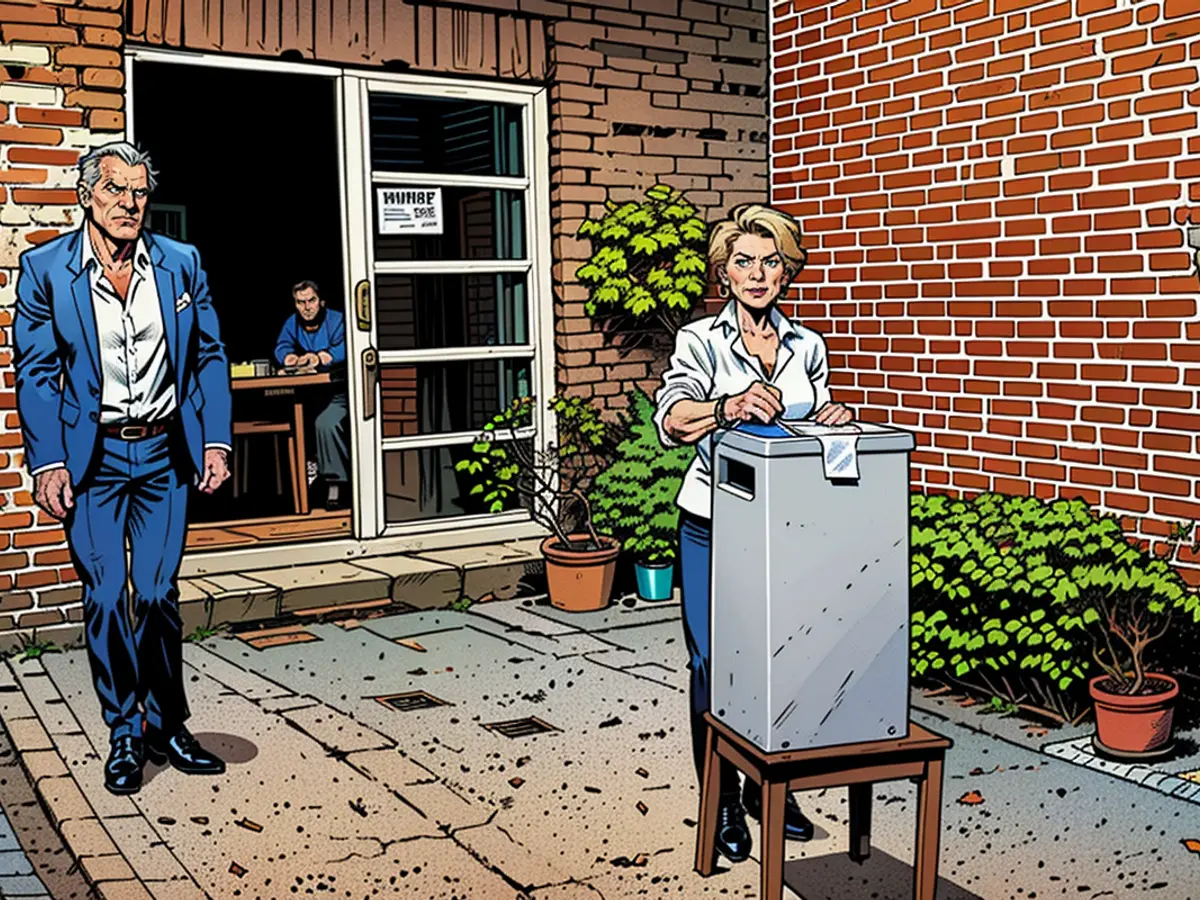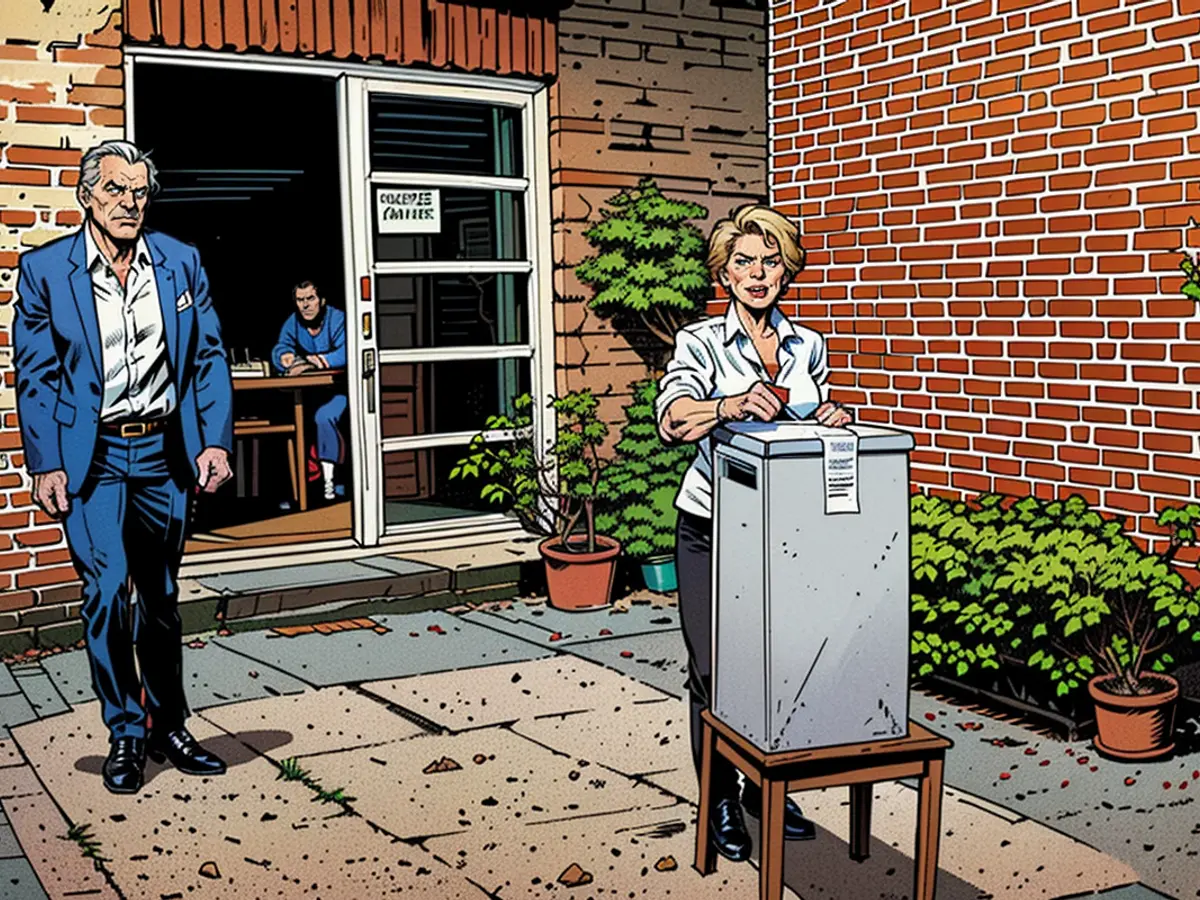14:27 European elections: All related information
Over 350 million individuals from 27 nations will be deciding the power dynamics and majority relationships in the European Parliament from June 6th to 9th. Who is voting when, and how many representatives? What do the polls suggest? Here are the essential numbers, maps, and infographics at a glance.
2:12 PM: The 103-year-old heads to the polling stationShe is the oldest voter in Cyprus: Argyri Achilleos, born in 1921 in Tala. Despite her advanced age, she makes her way to the polling station, aided by her cane and granddaughter, to cast her vote on the EU Parliament's composition.
1:52 PM: The "economist" voices concerns over prosperity and securityThe leader of the so-called "economists," Monika Schnitzer, expresses concern about the triumph of anti-European parties in the European elections. Wealth and security are under threat, she states in interviews with Funke media group. A result that would put the EU in peril and rely on pitting countries against each other would "dangerously jeopardize the wealth and security we have achieved through decades of cooperation," she warns. The ongoing crises underscore the necessity of having trustworthy partners in Europe, Schnitzer emphasizes. "Together, we can accomplish significantly more for our prosperity and security than any one country could on its own."
1:21 PM: The election is progressing smoothly - the federal election commissioner speaksIn Berlin, there's good news: The European election in Germany and the capital has been experiencing no significant issues so far - meaning the voting process is going well. This is the view of Federal Election Commissioner Ruth Brand at a meeting in a Berlin polling station. "Thus far, we have not received any notifications from the state election commissioners about serious disruptions. So, from our viewpoint, things are running smoothly and well," she says. Polling stations will remain open until 6:00 PM.
12:54 PM: Assessing the odds for von der Leyen's re-election
How much will Europe lean to the right in the election? ntv journalist Holger Schmidt-Denker evaluates the initial conditions of this election, often viewed in Germany as a "thinking election," and examines the prospects of EU Commission President Ursula von der Leyen for a second term.
12:34 PM: Missing voting notifications still allow voting
Federal Election Commissioner Ruth Brand encourages people to vote today. She justifies this appeal based on the "exceptional importance of the election for the influence of voters on future political decisions in the European Union." Simultaneously, she reminds people that even those who cannot locate their voting notifications can still vote by presenting their ID or passport. The requirement is simply that they are listed in the voter registry of their respective electoral district.
12:18 PM: Severe weather damages some polling stations in Austria
In Austria, certain polling stations for the EU election were inaccessible or destroyed due to the heavy weather. These polling stations include ones in Styria - specifically in Deutschfeistritz, north of Graz, and several in the Hartberg-Fürstenfeld district, according to authorities. However, the local mayors acted promptly and relocated the polling stations. Signs were placed in the communities indicating where the new polling stations are situated, and the mayors also reported the changes widely on social media. There's no expected disruption to the election, it is stated further. In Styria, torrential rain on Saturday caused damage to buildings and vehicles.
11:53 PM: It's already significant
For the tenth time, a direct EU parliament is being elected, but many eligible voters appear to undervalue the importance of their vote. Why the EU and the ballot box are often difficult to grasp and what role the "protest element" plays could be explained by political scientist Thorsten Faas.
11:36 PM: No statement from von der Leyen after voting
EU Commission President Ursula von der Leyen votes for the European election in her hometown in Lower Saxony. Along with her husband Heiko, she goes to the modest polling station in Burgdorf-Beinhorn in the Hannover region. However, she chooses not to make a statement and remains silent to any questions. After casting her vote, she briefly smiles for the cameras and departs the polling station after a few minutes. Ms. von der Leyen is aiming for a second term as President of the EU Commission.
Italy's polling stations will stay open until 11 pm local time. Beginning at 9:15 pm, the European Union is projected to publish initial results from post-election surveys and partial tallies. Germany may see its first projections around 6 pm. Contemporary surveys anticipate a conservative shift in the European Parliament, with the conservative European People's Party (EPP) potentially securing the most deputies. The Social Democrats (S&D) might claim 143 seats, whereas the Liberals could have 75. The right-wing European Conservatives and Reformists led by Italian Prime Minister Giorgia Meloni may gain 76 seats, while the smaller Identity and Democracy party, headed by French far-right populist Marine Le Pen, could win 67 seats.
At 10:35 am, the Federal Center for Political Education disclosed a record number of uses of their Voting Guide for the European elections. Over 10 million individuals have accessed the guide, outdoing the prior mark recorded in 2019 by four days. That election's Voting Guide was used 9.8 million times.
In a unique campaign, prominent figures are urging citizens to cast their ballots. They employ artificial intelligence to impersonate their 16-year-old selves, showcasing their "younger versions" in short videos while encouraging youth to vote. German artist Veronica Ferres, for instance, posts on Instagram, "It's about the future of our continent! For the first time, everyone 16 and older gets to vote! Use your voice and go vote on Sunday!" German comedian Carolin Kebekus addresses her 16-year-old self in her video: "Do you still remember what you wanted for Europe when you were 16? Sure, studying and working abroad, just getting out, broadening your horizons. I couldn't vote then. You can now. So, be more like 16 and vote for the Europe of your dreams." Germany allows voting for the European Parliament by those aged 16 and 17, with approximately 1.4 million individuals becoming eligible.
Politician Albrecht von Lucke projects an elevated voter turnout in the European election. Despite an anticipated shift to the right and a wake-up call for the German traffic light coalition, von Lucke maintains that this trend is not absolute: "A but."
In light of the history of low voter turnout in European elections, von Lucke predicts higher-than-average participation. A German-born Italian man, Eike Schmidt, may become the mayor of Florence. He is a candidate for the right-wing party Fratelli d'Italia, backed by Italian Prime Minister Giorgia Meloni and her coalition partners. Florence is typically a stronghold of the Italian left, but Schmidt might capitalize on the discord within the left-wing parties. Surveys place his competitor, Sara Funaro from the Democratic Party, ahead.
In addition to the European elections, municipal elections are underway in eight German states: Baden-Württemberg, Brandenburg, Hamburg, Mecklenburg-Vorpommern, Rhineland-Palatinate, Saarland, Saxony, and Saxony-Anhalt. Voters are urged to elect council members and mayors. Second-round elections in Thuringia, following the first round on May 26, are significant rehearsals for the state elections in September. Results from these municipal elections are expected to be released on Monday, with the European elections taking precedence.
Initiating at 8 am, the German European election officially commenced. This pan-European vote chooses a new parliament, and since 8 am, voting booths have been open in the country. From 11 am to 6 pm, a staggering 65 million people in Germany – including 16- and 17-year-olds, making their debut – will decide upon the structure of the European Parliament. Nearly 1,400 candidates compete for 35 parties and other political associations.
Today, besides Germany, voting is occurring in 20 other European Union (EU) nations. People in countries like the Netherlands, Ireland, and Slovakia have already made their picks. In total, over 360 million individuals can vote in the EU. The European Parliament consists of 720 seats, with 96 of these seats being occupied by Germans.

Read also:
In the midst of the European elections, local elections are also taking place in eight German states. These elections will determine council members and mayors, including the potential election of German-born Italian man Eike Schmidt as the mayor of Florence. (Local elections in Germany)
Despite the ongoing European elections, millions of individuals in other EU nations, such as the Netherlands and Ireland, are already casting their votes. Crafting a unified and cohesive policy amid the votes from 27 nations, including Germany, will be crucial for the newly elected European Parliament. (Local elections and European elections coexist)








